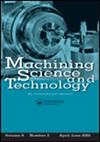A comparative analysis of grinding of AISI D2 tool steel under different environments
IF 2.6
4区 工程技术
Q2 ENGINEERING, MANUFACTURING
引用次数: 7
Abstract
Abstract Difficult-to-cut material, i.e., AISI D2 tool steel, has been widely adopted in metalworking industries to manufacture dies for piercing, blanking, drawing and thread rolling due to its excellent wear resistance and non-deforming properties. This article attempts an experimental study to determine the effect of cryogenic coolant (liquid nitrogen) on the grindability of AISI D2 tool steel as work material and its results are compared with the conventional dry and wet grinding methods. The effects of the cryogenic coolant on force components (i.e., tangential force, Ft and normal force, Fn ), specific grinding energy (u), force ratio, surface roughness parameters (Ra and Rz ) and microstructure were observed. The comparison results indicate a significant reduction in grindability indices such as 64% and 44% in Ft , 54% and 34% in Fn , 46% and 30% in Ra and 40% and 34% in Rz , respectively under cryogenic grinding at higher downfeed as followed to dry and wet grinding. The grinding performance in Ft , Fn , u and Ra was also improved with an increased delivery pressure of the liquid nitrogen (LN2). From the results, it is concluded that cryogenic coolant offers an influential method to improve grinding performance and surface integrity of AISI D2 tool steel.AISI D2工具钢在不同环境下磨削的对比分析
摘要难切削材料,即AISI D2工具钢,由于其优异的耐磨性和不变形性能,已被广泛应用于金属加工行业,用于制造穿孔、下料、拉伸和螺纹滚压模具。本文试图通过实验研究低温冷却剂(液氮)对AISID2工具钢可磨性的影响,并将其结果与传统的干式和湿式磨削方法进行了比较。观察了低温冷却剂对力分量(即切向力Ft和法向力Fn)、比磨削能(u)、力比、表面粗糙度参数(Ra和Rz)和微观结构的影响。比较结果表明,在更高下进料的低温研磨下,如干研磨和湿研磨,可磨性指数显著降低,如Ft的64%和44%,Fn的54%和34%,Ra的46%和30%,Rz的40%和34%。随着液氮(LN2)输送压力的增加,Ft、Fn、u和Ra的研磨性能也得到改善。结果表明,低温冷却剂为改善AISID2工具钢的磨削性能和表面完整性提供了一种有影响力的方法。
本文章由计算机程序翻译,如有差异,请以英文原文为准。
求助全文
约1分钟内获得全文
求助全文
来源期刊

Machining Science and Technology
工程技术-材料科学:综合
CiteScore
5.70
自引率
3.70%
发文量
18
审稿时长
6 months
期刊介绍:
Machining Science and Technology publishes original scientific and technical papers and review articles on topics related to traditional and nontraditional machining processes performed on all materials—metals and advanced alloys, polymers, ceramics, composites, and biomaterials.
Topics covered include:
-machining performance of all materials, including lightweight materials-
coated and special cutting tools: design and machining performance evaluation-
predictive models for machining performance and optimization, including machining dynamics-
measurement and analysis of machined surfaces-
sustainable machining: dry, near-dry, or Minimum Quantity Lubrication (MQL) and cryogenic machining processes
precision and micro/nano machining-
design and implementation of in-process sensors for monitoring and control of machining performance-
surface integrity in machining processes, including detection and characterization of machining damage-
new and advanced abrasive machining processes: design and performance analysis-
cutting fluids and special coolants/lubricants-
nontraditional and hybrid machining processes, including EDM, ECM, laser and plasma-assisted machining, waterjet and abrasive waterjet machining
 求助内容:
求助内容: 应助结果提醒方式:
应助结果提醒方式:


